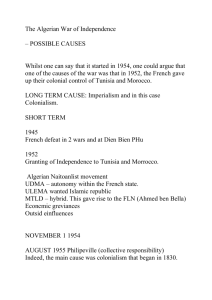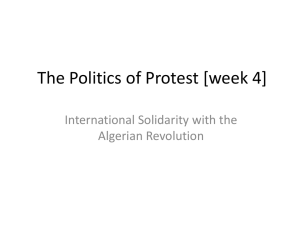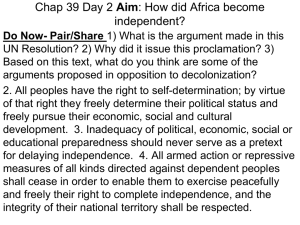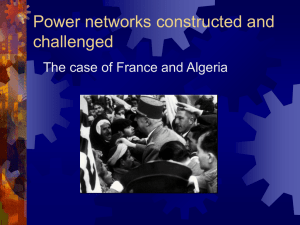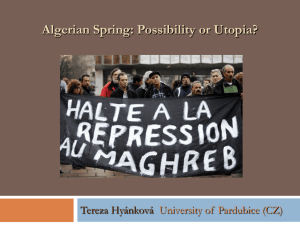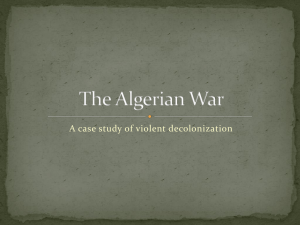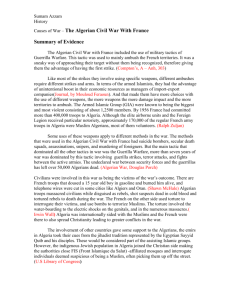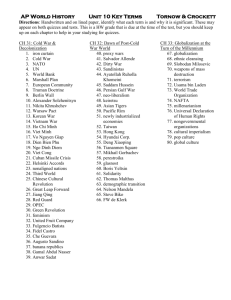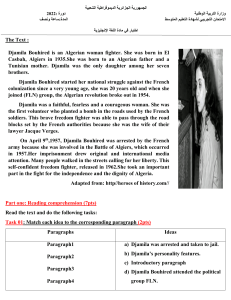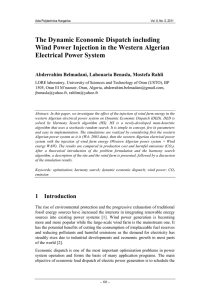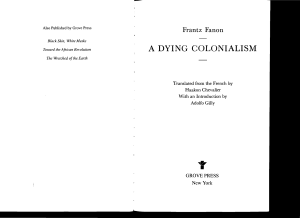document
advertisement
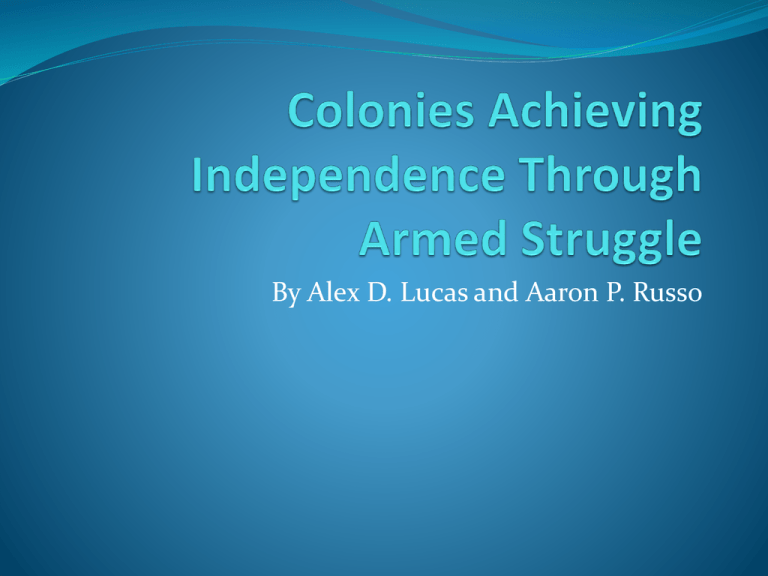
By Alex D. Lucas and Aaron P. Russo Conflict through armed struggle Give examples Why is it significant Algerian Independence Ruled by French Algerian Nationalism Anti Colonialist views from Arab countries Algerian War 1954-1962 FLN - Front de Libération Nationale Radical Socialist Party -> French view as terrorists All Saints Day Launched attacks throughout Algeria Military and Civilian targets (police posts, warehouses, communications facilities, and public utilities) Start of Algerian War con. From Cairo FLN called for “restoration of the Algerian state, sovereign, democratic, and social, within the framework of the principles of Islam.” French response – Prime Minister – Been French Stay French Battle of Philippeville June 18 th • FLN took more drastic measures – Recognition • Placed 500 commandos (Fellagha) in the city (French Aware) • Attack = 134 Fellagha, 71 French citizens and 52 Muslim politicians killed 1955 End of Algerian Conflict International pressure for Algerian Independence Peace talks btwn FLN and France Unanimous vote for independence De Gaul declared Alergia Independent in 1962 Vietnamese Independence Ruled by French Long History of being ruled over Oppressed - 1887-1954 Strong Sense of Nationalism Freedom fighters Ho Chi Mihn 1930 Viet Minh - 1941 Armed Conflict French Union army vs Viet Minh – Ho Chi Mihn Viet Minh – League for the independence of Vietnam Communist national independence coalition French were not communist Ho Chi Mihn Vietnamese communist leader Prime Minister from 1945-1955 After gaining independence from france Saigon = Ho chi Mihn city End of the Revolution War unpopular in France – Despite propaganda May 6th and 7th of 1954 – France Overrun by frontal assault French destroyed all weapons – called for ceasefire Geneva Conference Peace talks between French and Vietnam Proposed Communist North Vietnam and pro-Western South Vietnam. 17th parallel Elections for united country USA did not agree and stepped in Angolan Independence Ruled by Portuguese Empire Portuguese abolished Angolan rights Laws that discriminated Angolan Independence con. Unpopular war at home – Many Portuguese troops involved Portuguese uprising --- overthrew António de Oliveira Salazar Opened peace talks among the guerilla troops in Angola Granted them independence in 1973 Decolonization What is decolonization release from the status of a colony Europeans ALWAYS opened peace talks– WHY? Decolonization Declining European colonialism Lacking support Why? – Too much fighting (WWI & II) Impoverished Colonization was cause for wars Occupying colonies no longer worth lives lost through conflict Decolonization con. Now considered immoral --- War against totalitarian (eye opening) Focused on domestic issues after the war – not issues abroad No longer remnants of colonialism WHAT HAVE WE LEARNED TODAY!? When was the rapid decline of European colonialism? After World War I and World War II – Too much fighting Why did colonialism lose popularity? Occupying colonies no longer worth lives lost through conflict Do you think armed struggles were necessary in ending colonialism? SOURCES!!!!! Special thanks to google http://www.time.com/time/archive/collections/0,2142 8,c_algerian_war,00.shtml http://faculty.smu.edu/dsimon/Change-Viet.html http://en.wikipedia.org/wiki/Portuguese_Angola http://www.international.ucla.edu/article.asp?parenti d=7158 http://www.fordham.edu/halsall/mod/modsbook51.as p
